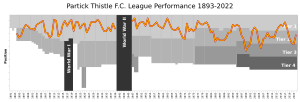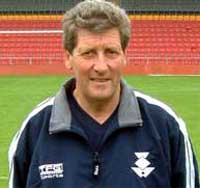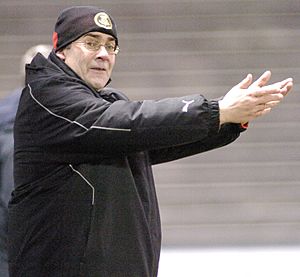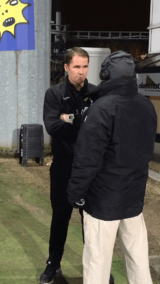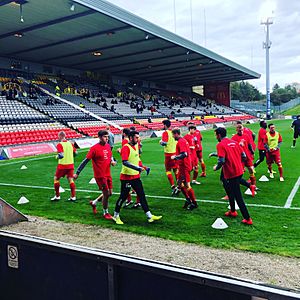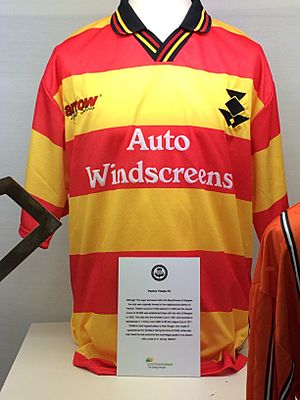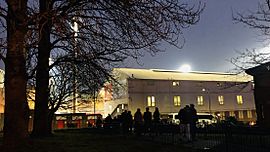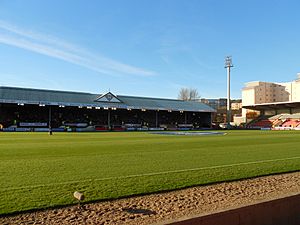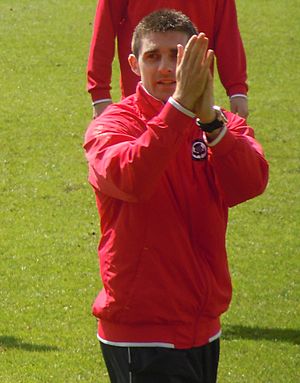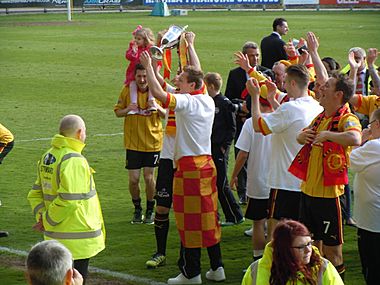Partick Thistle F.C. facts for kids
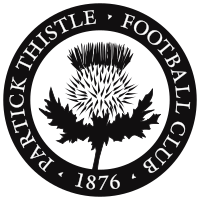 |
||
| Full name | Partick Thistle Football Club | |
|---|---|---|
| Nickname(s) | Thistle, The Jags, The Maryhill Magyars, The Harry Wraggs | |
| Founded | 1876 | |
| Ground | Firhill Stadium | |
| Capacity | 10,887 | |
| Chairman | Richard Beastall | |
| Head coach | Mark Wilson | |
| League | Scottish Premiership | |
| 2015–16 | Scottish Premiership, 9th | |
|
|
||
Partick Thistle Football Club is a professional football team from Glasgow, Scotland. They are known as "Thistle" or "The Jags." Even though their name is Partick, they play at Firhill Stadium in the Maryhill area of Glasgow. They have not played in Partick since 1908.
The club has been part of the Scottish Professional Football League (SPFL) since it started in 2013. Before that, they were members of the Scottish Football League. Since 1936, Thistle has worn red and yellow jerseys. These have changed over the years, with different stripes and designs. In 2009, they wore a special navy-blue kit. This celebrated 100 years at Firhill.
Since 1908, Partick Thistle has won the Scottish Second Division twice. They have also won the Scottish First Division six times. Their most recent win was in 2013. Thistle won the Scottish Cup in 1921. They also won the Scottish League Cup in 1971.
In 2013, they joined the new Scottish Premiership. They stayed there for five seasons. During this time, they got important investments. In 2017, they finished in the top six of Scottish football. This was their best finish in over 30 years. In the 2020–21 season, Thistle won Scottish League One. This is the third level of the SPFL. They then returned to the Scottish Championship.
Contents
- Club History
- How the Club Started
- Winning Cups and League Progress
- Tough Times and a Fan Campaign
- Comeback Under John Lambie
- Ups and Downs: Relegations and Play-offs
- Ian McCall's First Time as Manager (2007–2011)
- Jackie McNamara (2011–2013)
- The Archibald Era and the Scottish Premiership (2013–2018)
- Gary Caldwell (2018–2019)
- Ian McCall Returns (2019–2023) and Club Takeover
- Kris Doolan (2023–2025)
- Mark Wilson (2025–)
- Club Crest and Colours
- Stadium
- Notable Former Players
- Club Culture and Fans
- Sponsors
- Mascot
- Community Trust
- Current Squad
- Club Staff
- Managers
- Individual Achievements
- Honours
- Club Records
- European Record
- See also
Club History
How the Club Started
Partick Thistle Football Club began in 1876. It was formed in the town of Partick. At that time, Partick was separate from Glasgow. Glasgow took over Partick in 1912. The club's first recorded game was in February against Valencia. They won that match. Their first home ground was 'Overnewton Park'. It was near Overnewton Road.
Thistle became the most popular local team. In 1891, they joined the Scottish Football Alliance. This was a competition formed after the Scottish Football League started. The club won the Second Division in 1897. They were then chosen to play in the First Division. They were relegated but came back to the top level in 1900. They won the Second Division again that year. They were relegated once more but promoted in 1902. This was the last time they changed divisions for almost 70 years.
Since joining the professional leagues in 1893, Thistle was unpredictable. They spent four years in the First Division. They also spent five years in the Second. They earned promotion three times. In the 1902–03 Scottish Division One season, Thistle finished 8th. This was their highest league finish at that time.
For 33 years, they moved to many different home grounds. These included Kelvingrove, Jordanvale, and Inchview. In 1897, they moved to Meadowside. They played there until 1908. After being without a home for over a season, they moved to Firhill Stadium. This is in the Maryhill area of Glasgow. Their first game at Firhill was on September 18, 1909. They beat Dumbarton Harp 3–1.
Winning Cups and League Progress
In 1921, Thistle won the Scottish Cup. They beat Rangers 1–0 in the final. Johnny Blair scored the only goal. The game was played at Celtic Park. The Jags reached the final again nine years later. They played Rangers again. Rangers won 2–1 after a replay. The first match was a 0–0 draw. In 1935, Thistle won both the Glasgow Cup and the Charity Cup. These competitions were very important back then.
Thistle did not win another major cup for over 30 years. However, they stayed in the top league. They finished third in the league in 1947–48, 1953–54, and 1962–63.
On October 23, 1971, Davie McParland's team had a famous victory. They played Jock Stein's Celtic in the League Cup final. This was at Hampden Park in Glasgow. 62,470 fans watched Thistle take a 4–0 lead by half-time. Goals came from Alex Rae, Bobby Lawrie, and Jimmy Bone. Many talented players were in the Thistle squad. These included Alan Rough, Alex Forsyth, and Denis McQuade. Kenny Dalglish scored one goal for Celtic. But Thistle won easily with a 4–1 score. Before the match, a BBC broadcaster said Thistle had "no chance."
Tough Times and a Fan Campaign
Thistle's performance got worse in the 1980s. The club had faced tough times before. They had dropped to the second league twice in the 1970s. But they always bounced back quickly. The relegation in 1982 meant they stayed out of the top league for a long time.
Between 1986 and 1989, Ken Bates owned Thistle. He was the chairman of Chelsea. He wanted Thistle to be a club that helped develop players for Chelsea. But few players moved between the clubs. These years were not successful for Thistle. They finished 8th in the second league for five seasons in a row.
Even though they were promoted in 1992, they had big money problems. They owed over £1.5 million. In 1998, the club was almost bankrupt. Fans saved the club with a campaign called "Save the Jags." Despite avoiding financial ruin, Thistle was relegated to the third league in 1997–98. They almost went down even further the next season.
Comeback Under John Lambie
In 1999, John Lambie became manager for the third time. Under him, Thistle had a great comeback. They won promotions in 2000–01 and 2001–02. The second promotion put them in the Scottish Premier League. At that time, rules said clubs needed a stadium with at least 10,000 seats. To meet this, a new 2000-seat stand was built at Firhill. The club chairman later said this stand was too big. He felt it hurt their ability to compete. Thistle stayed in the SPL in 2002–03. They finished 10th, even though many expected them to be relegated.
Ups and Downs: Relegations and Play-offs
After Lambie retired in 2003, Thistle struggled. Gerry Collins was sacked. Derek Whyte and Gerry Britton took over as joint player-managers. But this did not help. Thistle was relegated at the end of the 2003–04 season. In 2004–05, they continued to struggle. Whyte and Britton were also dismissed. Dick Campbell took over. He could not stop them from being relegated to the Second Division.
However, he brought the club back to the First Division the next season. They did this through the new play-off system. They finished 4th in the league. This was a very unpredictable decade for the club. Between 1996 and 2006, Thistle was promoted three times. They were also relegated four times.
Ian McCall's First Time as Manager (2007–2011)
Thistle started well after returning to the First Division. But Dick Campbell was sacked in March 2007. This was after a series of bad results. Jimmy Bone and Terry Butcher managed the team temporarily. Then Ian McCall, a former player, became manager. In McCall's first season, Thistle finished 6th. They also had a good Scottish Cup run. They reached the quarter-finals. They lost to Rangers after a replay.
Their league form got even better in 2008–09. Thistle finished 2nd in the First Division. This was better than expected. Midfielder Gary Harkins won an award that season. Jonny Tuffey became the club's first full international player in years. McCall left his manager role in April 2011. He said it was for personal reasons. Jackie McNamara became the new manager.
Jackie McNamara (2011–2013)
McNamara and his assistant Simon Donnelly led Thistle to a sixth-place finish in 2011–12. The next season, Thistle started well. They looked like they could be promoted. They competed with Dunfermline and Greenock Morton. On January 29, 2013, Dundee United asked to speak to McNamara. They wanted him to be their new manager. The next day, McNamara and Donnelly left Thistle. They became the new management team at United. Thistle was second in the league at the time. The club received money because McNamara was still under contract.
The Archibald Era and the Scottish Premiership (2013–2018)
On January 30, 2013, Alan Archibald became the club's temporary manager. Former Thistle player Scott Paterson was his assistant. On March 22, they were given the job permanently. The next month, on April 20, 2013, the club won promotion. They secured the First Division championship. They beat Falkirk 2–0. This meant Thistle returned to the top league after nine years. The team also lost the Scottish Challenge Cup final on penalties.
Thistle's return to the Premiership had mixed results. They had a good record in away games. But it took months to win a home game. They finally beat Aberdeen 3–1 at Firhill in February 2014. Thistle avoided relegation. They finished third from bottom. This was after a 4–2 win against Hearts. Thistle announced they had no debt in November 2015.
In the 2015–16 Scottish Premiership season, Thistle signed many key players to long contracts. These included Kris Doolan and Callum Booth. On May 7, 2016, Thistle secured their Premiership spot. They won 2–0 against Kilmarnock. This result meant Archibald had the most top-flight wins as a manager. On April 8, 2017, Thistle beat Motherwell 1–0. This put them in the top six for the first time since 2000–01.
In the 2017–18 Scottish Premiership, Thistle finished 11th. They just avoided automatic relegation. They then played in the play-offs against Livingston. Thistle lost the first game 2–1. They lost the second game 0–1 at Firhill. This meant Thistle was relegated to the Scottish Championship. They had been in the top league for five years. Archibald remained manager for the next season. Many players left the club.
After a bad start to the 2018–19 Scottish Championship season, Archibald was sacked. This was on October 6, 2018. Thistle was 8th in the Championship.
Gary Caldwell (2018–2019)
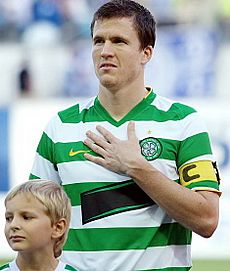
On October 15, 2018, Gary Caldwell became the new manager. He was a former player for Celtic and Scotland. The chairman said he planned to build a strong defense. This would allow the team to play attacking football.
Thistle's first season after relegation was hard. They were expected to be promoted. But they were at the bottom of the league by December. They faced possibly being relegated again. Caldwell changed many players in January. He signed Scott McDonald, who scored 7 goals in 13 games. Caldwell turned the season around. The club finished 6th. They avoided further relegation. Caldwell released striker Kris Doolan. Doolan had been at the club for ten years. Other players also left.
In June 2019, a group led by Chien Lee and Paul Conway tried to buy Partick Thistle. Talks continued into the season. The Partick Thistle Trust, a fan group, urged shareholders not to support the takeover. By November, the takeover had not happened. Thistle had another bad start to the Championship season. They got only two points in five games. Caldwell was sacked after a 1–1 draw.
Ian McCall Returns (2019–2023) and Club Takeover
After Caldwell was sacked, Ian McCall became manager again. This was on September 23, 2019.
On November 21, Colin Weir, a Euromillions winner, bought Partick Thistle. He bought most of the shares and land at Firhill. Weir immediately gave the land back to the club. Weir's plan was to give the club shares to the fans. This would make Partick Thistle a fan-owned club. A group of fans oversaw this transfer. After Weir's takeover, plans for a new training ground were put on hold. The focus was on making the club fan-owned. In December 2019, Colin Weir passed away at 71.
McCall made several changes in January 2020. He brought in players like Brian Graham and Zak Rudden. Veteran striker Kenny Miller left. But Thistle still struggled. They lost to Celtic in the Scottish Cup. They also lost in the Scottish Challenge Cup semi-final.
Scottish football stopped in March 2020 because of the COVID-19 pandemic. Thistle was in last place in the Championship. A vote was taken to end the season early. This meant Thistle was relegated to League One. There were talks about changing the league structure. This would have stopped Thistle from being relegated. But the talks failed. Thistle joined a legal action with Heart of Midlothian against the SPFL. A panel ruled that the SPFL acted correctly. This confirmed the relegations of Hearts and Thistle. Thistle had now been relegated twice in three seasons.
The 2020–21 Scottish League One season was interrupted by COVID-19. It stopped for months and restarted in March. Clubs agreed to a shorter 22-game season. After a mixed start, Thistle had a great run in April. They won six games and drew two. They won the 2020–21 Scottish League One title on April 29, 2021. They beat Falkirk 5–0. This was their first trophy in eight years. They were promoted back to the Scottish Championship. Manager Ian McCall said it was his most satisfying title win.
When they returned to the Championship, Thistle finished 4th. This earned them a promotion play-off spot. Thistle lost to Inverness in the play-offs. This ended their 2021–22 season. Thistle started the 2022–23 season well. They were top of the Championship after 10 games. However, they then had a bad run of form. After losing to Hamilton, Cove Rangers, and Rangers, Ian McCall and his assistants were sacked. Thistle was 5th in the Championship. Former player and club legend Kris Doolan was appointed interim manager.
Kris Doolan (2023–2025)
After McCall left, Kris Doolan became interim manager. Paul MacDonald was his assistant. Doolan won two away games and drew one. He was then appointed permanent manager on March 3, 2023. In his first game as permanent manager, Thistle won 3–0 at home.
Thistle finished 4th in the 2022–23 season under Doolan. This meant they entered the play-offs. Thistle won their quarter-final 8–3 against Queen's Park. They were the first 4th-place team to get past this stage. They then won their semi-final 8–0 against Ayr United. This sent them to the Premiership play-off finals. Thistle faced Ross County. They won the first game 2–0. But they lost the second game 3–1. The tie went to extra time and then penalties. Ross County won 5–4. This meant Thistle stayed in the Scottish Championship.
In Doolan's first full season, Thistle finished 3rd in the Championship. They entered the play-offs again. Thistle beat Airdrie 3–2 to reach the semi-finals. They faced Raith Rovers. Thistle lost the first game 2–1 at home. But they won the away game 2–1. The tie went to extra time and penalties. Raith won 4–3.
Thistle struggled in the 2024–25 season. They spent most of it in 4th place. After a poor run of results, Doolan left his manager position on February 18, 2025.
Mark Wilson (2025–)
After Kris Doolan left, Brian Graham and Mark Wilson became interim managers. Graham was a first-team player and captain. Wilson was the under-18s coach.
On March 31, after six games with three wins and three draws, Graham and Wilson stayed in charge until the end of the 2024–25 season. On April 7, Ian Baraclough was appointed as the club's first sporting director.
Graham and Wilson led Thistle to the play-offs with a 4th-place finish. They lost the first play-off quarter-final 1–0 at home to Ayr. But they won the away leg 2–0. Brian Graham scored his 99th and 100th goals for the club in this game. In the semi-finals, Thistle lost both games 2–0 to Livingston. This ended their season.
On May 30, 2025, Mark Wilson became the permanent head coach of Partick Thistle. Brian Graham was offered a player-coach role but declined. In June 2025, Alex Rae joined the club as assistant head coach to Mark Wilson. In Wilson's first game as permanent coach, Thistle won 4–1 against Edinburgh City. This was in the Scottish League Cup group stages.
Club Crest and Colours
The first badge on a Partick Thistle kit was a thistle design. Every logo since has featured a thistle. The thistle first appeared in 1902, then again in 1909. It stayed until 1978. A new logo with the thistle inside a circle was then used. A modern logo with the thistle on a rectangle came in 1990. The current badge was introduced in 2008.
The Jags used different colours in their early years. From the start until 1900, their kits were mostly blue. They had red and white details. Then, for a short time, players wore orange and black striped tops. These had white shorts and black socks. In 1905, they used colours similar to Aston Villa. The club went back to mostly blue kits in 1909. In the 1936–37 season, they changed to red, yellow, and black. These are the colours they are known for today. This change happened because they borrowed kits from a local rugby team.
In 2008–09 and 2009–10, Thistle was the first Scottish club to use pink as the main colour for their away kit. In 2008–09, it was silver and pink hoops. During the 2014–15 season, Partick Thistle supported the Breast Cancer Care charity. They wore a black and pink away shirt. It had the charity ribbon on it. Part of the money from kit sales went to Breast Cancer Care.
For the 2019–20 season, Partick Thistle released a new away kit. It had a Rainbow flag design under the sleeves. This showed support for the LGBT movement. They were the first Scottish club to put the flag on a football jersey. Club executive Gerry Britton said they wanted to show they were inclusive. This design got attention worldwide. It was featured by major news networks. The Kingsley mascot also became very popular.
Stadium
Before moving to Maryhill in 1909, Partick Thistle played at many places around Glasgow. These included Kelvingrove Park and Muir Park. In 1897, the club moved to Meadowside. This was near the River Clyde. But in 1908, Thistle had to leave the area. A new shipyard was being built there.
After playing at many other grounds, Partick Thistle moved to Firhill Stadium in 1909. They bought land from the Caledonian Railway for £5,500. The stadium has three stands. The Main Stand was built in 1927. It can seat about 2,900 fans. The Jackie Husband Stand was built in 1994. It holds about 6,263 people. The North Stand was renamed the John Lambie Stand in 2018. This was to honor the famous club manager. It can hold over 2000 fans. On the south side, there is a grass bank called "The Bing." This used to be standing terraces. It was removed in 2006 for safety reasons. There have been plans to rebuild this area, but nothing has happened yet.
Firhill has been used by other football and rugby teams. Between 1986 and 1991, Clyde shared the stadium with Thistle. Hamilton Academical also shared it for two periods. In December 2005, Firhill became home to the Glasgow Warriors rugby team. They stayed there for several years. Celtic's under-20 team also used the ground in 2012–13.
In the 2013–14 season, the Main Stand was reopened. This was to seat many away supporters. In June 2016, the Main Stand was renamed The Colin Weir Stand. This honored Colin Weir. He was the first patron of Partick Thistle. He gave many donations to the club's youth system.
To get to Firhill, you can use the Glasgow Subway. Kelvinbridge and St George's Cross stations are a 15-minute walk away. The A81 road (Maryhill Road) leads to Firhill Road. Several local buses from the city center also use this route. Maryhill and Possilpark & Parkhouse are the closest train stations. They are served by trains from Glasgow Queen Street. But they are about a 30-minute walk from the stadium.
Training Facilities
For many years, Thistle did not have a permanent training ground. They used other facilities. This limited their ability to train freely.
As of 2014, the club trained at the University of Glasgow's Garscube Sports Complex. This is on the edge of the city.
In April 2017, the club's situation improved. Colin and Christine Weir invested in the club again. This allowed plans for a new £4 million training center. Thistle expected to rent this from the Weirs' company. In July 2018, the new facility was named after Davie McParland. He was the manager when Thistle won the League Cup in 1971. The facility was to be near Kirkintilloch. However, plans for the new facility were stopped in December 2019. The investment money was used by Colin Weir to buy the club. This helped make it a fan-owned club. Colin Weir passed away shortly after this announcement.
For the 2020–21 Scottish League One season, Thistle trained at Burnbrae Stadium. This is home to the rugby union club West of Scotland FC.
Notable Former Players
Some former players and managers have been honored. They are in either the Scottish Football Hall of Fame or Partick Thistle's own Hall of Fame. This includes players from the 1921 Scottish Cup final and the 1971 League Cup final.
Scottish Hall of Fame
Club Hall of Fame
Here is a partial list of those in the Club Hall of Fame.
 Andy Anderson
Andy Anderson Alan Archibald
Alan Archibald Kenny Arthur
Kenny Arthur Bertie Auld
Bertie Auld Gerry Britton
Gerry Britton Jackie Campbell
Jackie Campbell Chic Charnley
Chic Charnley Nobby Clark
Nobby Clark Kris Doolan
Kris Doolan Neil Duffy
Neil Duffy Chris Erskine
Chris Erskine John Harvey
John Harvey Bobby Houston
Bobby Houston Jackie Husband
Jackie Husband John Lambie
John Lambie Bobby Law
Bobby Law Danny Lennon
Danny Lennon Peter McKennan
Peter McKennan Johnny MacKenzie
Johnny MacKenzie Davie McParland
Davie McParland Denis McQuade
Denis McQuade Alex O'Hara
Alex O'Hara Alex Rae
Alex Rae Doug Somner
Doug Somner Kenny Watson
Kenny Watson
Club Culture and Fans
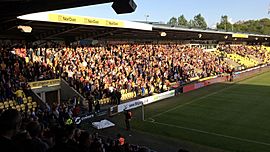
The club has a smaller fan base. Most fans are from Northern Glasgow. But they also have supporters around the world. Being near many universities, the club attracts new fans.
The club is proud to be welcoming to everyone. They are not involved in the big rivalries that divide some other Glasgow clubs.
Rivalries
Partick Thistle plays against neighbors Rangers and Celtic. However, these clubs are much bigger. So, the rivalry is not as strong. The "Glasgow derby" for Thistle is usually against Clyde. This is sometimes called the "Old Firm alternative."
In the past, there were strong rivalries with Airdrieonians. But this has faded over time. Rivalries also existed with Clydebank and Kilmarnock. More recently, a rivalry has grown with Morton. This started during the 2012–13 title race. Thistle won the league, and Morton finished second. A smaller rivalry has also started with Queen's Park. This is because Queen's Park has moved up the leagues.
Chants and Songs
Thistle fans sing songs during matches. Some are common football chants. Others are unique to the club. You can often hear songs like "He Wears Number 9" and "Rellow Army." Other popular songs are "Mary fae Maryhill" and "Over Land and Sea." Fans also sing "Forever and Ever" and "We've Followed the Thistle for Many a Day." "Oh Maryhill is wonderful" and "We’re a well known Glasgow Football Team" are also favorites. Chants for "Super Ian McCall" and "We score when we want" are common. "Gerry Britton is the King of Spain" is another fun one.
The song Return to Firhill Road is a newer addition. It was recorded by The Lambie McParlands.
Famous Supporters
- American actor David Hasselhoff has said he is a fan. He likes the club's values. Mr. Hasselhoff also met some of the team for a TV interview.
- Maryhill-born actor Robert Carlyle is a famous supporter. He said he would rather watch the Jags than other big clubs.
- Craig Ferguson, a former American talk show host, is a fan.
- The historian Niall Ferguson supported the club when he grew up in Glasgow.
- Laura Kuenssberg, a BBC political editor, is a supporter.
- Hollyoaks actor Chris Fountain also supports the club.
- Jack Revill, a DJ known as Jackmaster, is a fan.
- Former Tennis player Colin Fleming is a Jags fan. He followed his family's tradition.
- Former Labour leader Jeremy Corbyn has been seen wearing a Partick Thistle scarf. He has also mentioned the club.
Sponsors
The club's main sponsor is Just Employment Law. Before them, Kingsford Capital Management was the main sponsor. MacB also sponsored Partick Thistle from 2012 to 2015. Scottish security company Alarmfast also sponsored Thistle for the 2014–15 season.
Thistle's kit maker is O'Neills, an Irish company. They took over from the Spanish company Joma in 2020.
| Kit Suppliers | ||
|---|---|---|
| Dates | Supplier | |
| 1977–1983 | Umbro | |
| 1983–1984 | Unbranded | |
| 1984–1989 | Umbro | |
| 1989–1993 | Spall Sports | |
| 1993–1994 | Bukta | |
| 1994–1995 | Matchwinner | |
| 1995–1997 | Le Coq Sportif | |
| 1997–1999 | Arrow | |
| 1999–2000 | Rossco | |
| 2000–2002 | Secca Sports | |
| 2002–2006 | TFG Sports | |
| 2006–2008 | Diadora | |
| 2008–2013 | Puma | |
| 2013–2020 | Joma | |
| 2020– | O'Neills | |
| Shirt Sponsors | |
|---|---|
| Dates | Sponsor |
| 1983–1986 | Morton Rolls |
| 1986–1987 | Ashoka West End |
| 1987–1989 | Colonel Gee's Carpets |
| 1989–1990 | Watson Towers |
| 1990–1996 | Texstyle World |
| 1996–1997 | DLS |
| 1997–1999 | Auto Windscreens |
| 1999–2007 | D.H.Morris Group |
| 2007–2008 | Resolution Asset Management |
| 2008–2011 | Ignis Asset Management |
| 2011–2012 | MacB Water |
| 2012 | Just Employment Law |
| 2012–2015 | MacB Water |
| 2015–2018 | Kingsford Capital Management |
| 2018– | Just Employment Law |
Mascot
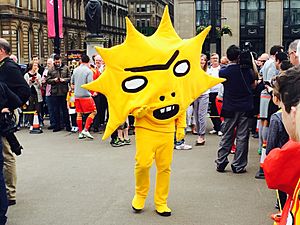
Partick Thistle's current mascot is a sun-shaped character named Kingsley. He was designed by artist David Shrigley. Kingsley was introduced on June 22, 2015. This was when Thistle got a new sponsorship. Kingsley took over from Jaggy MacBee, a bumble bee mascot. Before that, the mascot was a toucan named Pee Tee.
Kingsley became very famous online. He was a trending topic on Twitter. Major news networks like CNN and The Washington Post also featured him. Partick Thistle's general manager, Ian Maxwell, said Kingsley brought huge attention to the club. He called it the "biggest amount of publicity from a sponsorship launch in Scottish football history." Kingsley has also become a popular item for club merchandise.
Community Trust
Partick Thistle Women's Team
Thistle Weir Ladies Football Club started in 2014. It was part of the Thistle Weir Academy. In October 2018, the team was promoted. They joined the Scottish Women's Premier League 2 (SWPL 2). This is the second-highest level for women's football in Scotland. In January 2019, the club changed its name. It became Partick Thistle Women's Football Club.
The team trains at the Firhill Complex in Maryhill. They play their matches at Petershill Park in Springburn.
Thistle Weir Youth Academy
In October 2013, Chris and Colin Weir donated £750,000 to Partick Thistle. They were millionaires and long-time fans. This money helped set up a new youth academy. It was named the Thistle Weir Youth Academy. Young players who have come from this academy include James Penrice and Aidan Fitzpatrick.
Current Squad
First-Team Squad
|
|
Club Staff
Boardroom
| Name | Role |
|---|---|
| Richard Beastall | Chairman |
| Elliot Gilmour | Director |
| Alistair Gray | Director |
| Caroline Mackie | Director |
| Donald McClymont | Director |
| Allan McGraw | Director |
| Grant Stupart | Director |
| Levi Gill | General manager |
| Ian Baraclough | Sporting director |
| Lee Turnbull | Head of recruitment |
| Dr Alan Robertson | Honorary vice president |
Coaching and Backroom Staff
| Name | Role |
|---|---|
| Mark Wilson | Head coach |
| Alex Rae | Assistant head coach |
| Kenny Arthur | Goalkeeping coach |
| Craig Dargo | Partick Thistle Youth Academy director |
| Gary Irvine | Head of professional phase |
| Greg McKean | Club doctor |
| Robin Dicke | Physiotherapist |
| Allan Findlay | Groundsman |
| Paul McDonald | Kit manager |
Source:
Managers
| Name | Years | Honours |
|---|---|---|
| George Easton | 1903–1929 | Scottish Cup (1920–21) |
| Donald Turner | 1929–1947 | |
| David Meiklejohn | 1947–1959 | 3rd in the Scottish League (1947–48 & 1953–54) |
| Willie Thornton | 1959–1968 | 3rd in the Scottish League (1962–63) |
| Scot Symon | 1968–1970 | |
| Davie McParland | 1970–1974 | League Cup (1971), Division Two (1970–71) |
| Bertie Auld | 1974–1980 | Division One (1975–76) |
| Peter Cormack | 1980–1984 | |
| Benny Rooney | 1984–1986 | |
| Bertie Auld | 1986 | |
| Derek Johnstone | 1986–1987 | |
| Billy Lamont | 1987–1988 | |
| John Lambie | 1988–1989 | |
| Sandy Clark | 1989–1990 | |
| John Lambie | 1990–1995 | Promotion to Premier Division (1991–92) |
| Murdo MacLeod | 1995–1997 | |
| John McVeigh | 1997–1998 | |
| Tommy Bryce | 1998–1999 | |
| John Lambie | 1999–2003 | First Division (2001–02), Second Division (2000–01) |
| Gerry Collins | 2003 | |
| Gerry Britton | 2003–2005 | |
| Derek Whyte | ||
| Dick Campbell | 2005–2007 | First Division Playoffs (2005–06) |
| Ian McCall | 2007–2011 | |
| Jackie McNamara | 2011–2013 | |
| Alan Archibald | 2013–2018 | First Division (2012–13) |
| Gary Caldwell | 2018–2019 | |
| Ian McCall | 2019–2023 | League One (2020–21) |
| Kris Doolan | 2023–2025 | |
| Mark Wilson (head coach) | 2025– |
Individual Achievements
Most Appearances
| Name | Apps | Career |
|---|---|---|
| Alan Rough | 624 | 1969–1982 |
| Davie McParland | 587 | 1953–1974 |
| Jackie Campbell | 579 | 1963–1982 |
| Willie Sharp | 571 | 1939–1957 |
| Jimmy McGowan | 543 | 1941–1956 |
| Eddie McLeod | 495 | 1926–1940 |
| Willie Bulloch | 471 | 1909–1923 |
| Alex Elliott | 454 | 1927–1940 |
| Stuart Bannigan | 441 | 2010–2025 |
| John Harvey | 435 | 1951–1966 |
| Alan Archibald | 423 | 1997–2003, 2007–2013 |
| Kris Doolan | 401 | 2009–2019 |
All-Time Top Goalscorers
| Name | Goals | Career |
|---|---|---|
| Willie Sharp | 229 | 1939–1957 |
| Willie Paul | 186 | 1884–1899 |
| George Smith | 125 | 1953–1964 |
| Jimmy Walker | 121 | 1946–1957 |
| Kris Doolan | 2009–2019 | |
| Johnny Torbet | 116 | 1924–1933 |
| Willie Newall | 101 | 1938–1945 |
| Dougie Somner | 1974–1979 | |
| Brian Graham | 100 | 2020–2025 |
| Alex Hair | 98 | 1923–1928 |
| David Ness | 97 | 1923–1935 |
Honours
Major Trophies
- Scottish Cup:
- Winners (1): 1920–21
- Runners-up (1): 1929–30
- Scottish League Cup:
- Winners (1): 1971–72
- Runners-up (3): 1953–54, 1956–57, 1958–59
League Titles
- Scottish Championship / Scottish Football League First Division, second tier:
- Winners (6): 1896–97, 1899–1900, 1970–71, 1975–76, 2001–02, 2012–13
- Runners-up (3): 1901–02, 1991–92, 2008–09
- Scottish League One / Scottish Football League Second Division, third tier:
- Winners (2): 2000–01, 2020–21
- Play-off Winners: 2005–06
- Scottish Challenge Cup:
- Runners-up: 2012–13
Other Cups
- Glasgow Cup
- Winners (7): 1934–35, 1950–51, 1952–53, 1954–55, 1960–61, 1980–81, 1988–89
- Runners-up (11): 1888–89, 1900–01, 1911–12, 1914–15, 1917–18, 1919–20, 1932–33, 1936–37, 1959–60, 1966–67, 1968–69
- Glasgow Merchants Charity Cup
- Winners (3): 1926–27, 1934–35, 1948–49
- Runners-up (7): 1904–05, 1915–16, 1917–18, 1940–41, 1950–51, 1955–56, 1959–60
- Summer Cup: 1945
- Glasgow Dental Hospital Cup: 1928
- West of Scotland FA Cup: 1879
- Yoker Cup: 1881, 1882, 1883
- Partick Championship: 1884
- Greenock Charity Cup: 1893
- Paisley Charity Cup: 1936
- British Cup-Winners' Challenge: 1921
- Tennents' Sixes: 1993 (last winners)
- Coronation Cup: 1928, 1929
- ARR Craib Cup: 2012
Club Records
- Highest home attendance: 49,838 vs Rangers, Scottish First Division, February 18, 1922
- Most league appearances: Alan Rough, 410
- Most league goals in a season: Alex Hair, 41, 1926–27
- Record defeat: 0–10 v Queen's Park, Scottish Cup, December 3, 1881
- Record victory: 16–0 v Royal Albert, Scottish Cup 1st round, January 17, 1931
- Record points total: 78, Scottish First Division, 2012–13
- Record transfer fee paid: £85,000 to Celtic for Andy Murdoch, February 1991
- Record transfer fee received: £350,000 from Barnsley for Liam Lindsay, June 2017 / £350,000 from Norwich City for Aidan Fitzpatrick, July 2019
European Record
Thistle has played in European competitions three times. The first time, they qualified by finishing third in the First Division. They reached the second round of the Fairs Cup. They were then knocked out by Spartak Brno. They qualified for the UEFA Cup in 1972–73. This was after winning the League Cup the season before. Hungarian team Honvéd eliminated them in the first round. Their most recent European campaign was the 1995 UEFA Intertoto Cup. They finished 4th in their group with four points.
| Season | Competition | Round | Opponent | Home | Away | Aggregate |
|---|---|---|---|---|---|---|
| 1963–64 | Inter-Cities Fairs Cup | First round | 3–0 | 4–1 | 7–1 | |
| Second round | 3–2 | 0–4 | 3–6 | |||
| 1972–73 | UEFA Cup | First round | 0–3 | 0–1 | 0–4 | |
| 1995–96 | UEFA Intertoto Cup | Group 6 | – | 2–2 | – | |
| 3–1 | – | – | ||||
| – | 0–1 | – | ||||
| 1–2 | – | – |
See also
 In Spanish: Partick Thistle Football Club para niños
In Spanish: Partick Thistle Football Club para niños
 | Sharif Bey |
 | Hale Woodruff |
 | Richmond Barthé |
 | Purvis Young |


